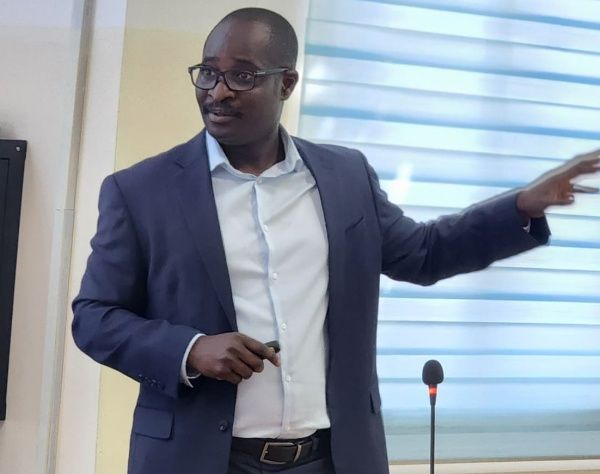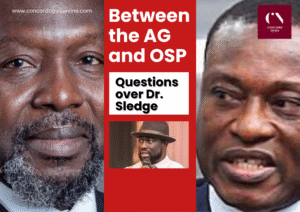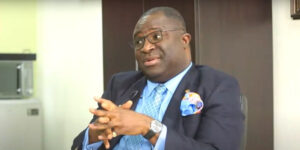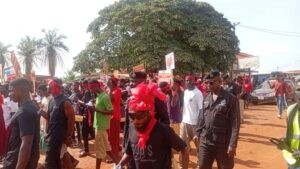Russia-Ukraine war not to blame for our economic woes – Economist

Dr. Annan Abakah
The popular belief that the Russia-Ukraine war is a primary cause of the Ghanaian cedi’s devaluation has been refuted by renowned scholar and professor Dr. Alex Annan Abakah of Bentley University.
Speaking on Thursday, November 28, at a gathering hosted by the Public Financial Management (PFM) Tax Africa Network, Dr. Abakah shared the results of extensive research into the factors causing Ghana’s currency depreciation. His research challenged the unrepented tales by showing that the ongoing war has had a negligible effect on the Cedi’s performance.
The analysis also found that the COVID-19 pandemic contributed around 11% of the Cedi’s devaluation.
The findings further explain that Ghana’s currency exhibited considerable resilience during the epidemic, depreciating at a low rate compared to the large fall witnessed after the pandemic.
According to Dr. Abakah, this shift raises significant concerns about the fundamental mechanisms influencing the currency. He argued that the significant depreciation following the pandemic reveals deeper structural flaws inside Ghana’s economy rather than external shocks.
The study showed no meaningful connection between the Russia-Ukraine war and the cedi’s devaluation, unlike what many people believe. Dr. Abakah clarified that during the time in question, the value of the Russian and Ukrainian currencies increased relative to the cedi.
According to him, this result emphasizes how crucial it is to look at internal economic problems rather than blaming them on outside forces. He went on to say that the Ghanaian cedi depreciated five times more than the Kenyan shilling, eclipsing the depreciation of other African currencies.
According to the report, the cedi depreciated by an astounding 104.69% after COVID, while the Kenyan shilling declined by 21.17%. The cedi lost 128.26% of its value during the Russia-Ukraine war, while the Kenyan shilling lost 25.66%.
The analysis emphasizes that the main causes of the Cedi’s decline are Ghana’s dismal economic fundamentals. Dr. Abakah clarified that while external shocks such as the COVID-19 epidemic can have an impact on economies all around the world, the strength of a nation’s economic structure determines how severe and long-lasting those effects will be.
Sadly, he argued, Ghana’s fundamentals have fallen short, leaving the economy open to long-term difficulties. Prior to the latest debt restructuring, Ghana’s economic status made matters worse, according to Dr. Abakah.
The nation’s interest-to-revenue ratio was higher than pre-HIPC levels in 2022, at 47.27%. This indicates that interest payments on loans accounted for about half of Ghana’s income, leaving little left over for investments in human capital, infrastructure, and other essential expenses. Ghana’s capacity to fortify its economy and successfully handle external shocks has been hampered by this imbalance.
In order to combat the cedi’s ongoing devaluation and promote economic resilience, Dr. Abakah suggested a multifaceted strategy. In order to ensure that government expenditure is in accordance with revenues, he advocated for legislation that would impose debt ceilings and enforce fiscal restraint.
In order to generate future revenue and create employment prospects, he stressed the significance of prioritising investments in infrastructure and human capital development. The necessity for Ghana to use its natural resources to promote industrialisation was also emphasised by Dr. Abakah.
He contended that modernising agriculture is critical to establishing food security and supporting long-term economic growth. Furthermore, he pushed for the enforcement of foreign exchange market laws to stabilise the currency, as well as the control of foreign corporations’ repatriation of profits and dividends to relieve pressure on the cedi.
The findings highlight that, while external variables such as the COVID-19 epidemic and worldwide conflicts may contribute to economic swings, the amount of their impact on Ghana’s economy is mostly controlled by the country’s own structural flaws.
Dr. John Asafo Agyei, Senior Fellow at the Africa Centre for Economic Transformation, delivered statements during the occasion that were similar to those of Dr. Alex Annan Abakah.
He maintained that because Ghana’s economy has remained mostly unchanged since gaining independence, its foundations are still weak.
He emphasised that Ghana needs to start doing things differently starting in 2025 and put policies in place that would fortify the economy’s foundations so that it can resist shocks from the outside world.
Source: Peacefmonline








